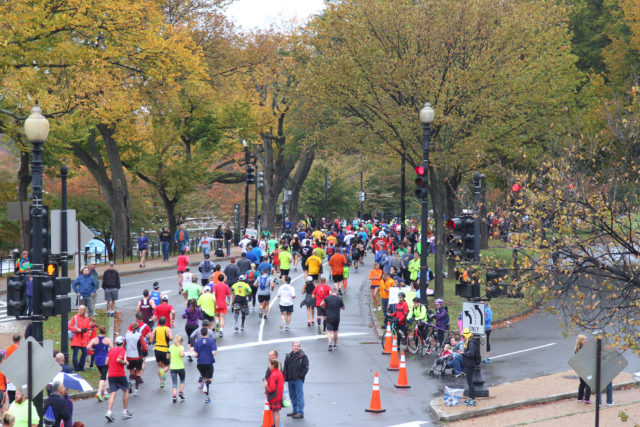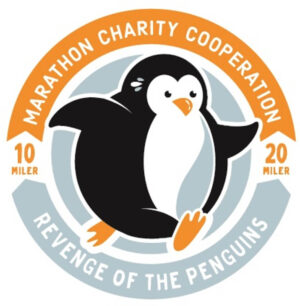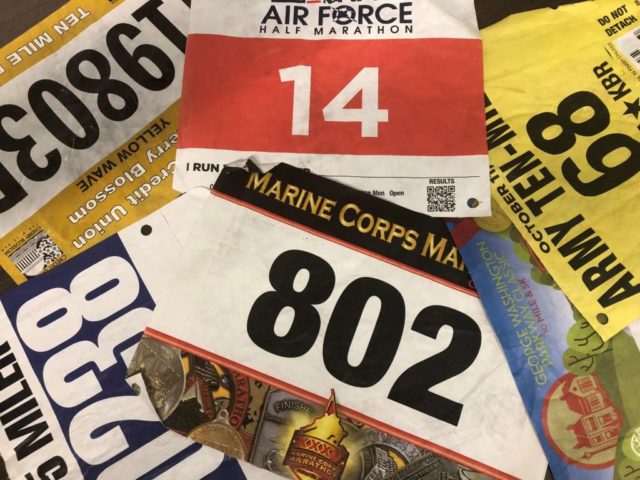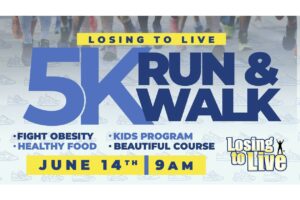- The National Park Service will keep Beach Drive closed to through traffic year-round in D.C.’s Rock Creek Park, following the traffic patterns that have been in place most of the last two and a half years.
- Northwood High School alumus Obsaa Feta, running for Miami University, won the Mid-American Conference Cross Country Championship.
- John Champe High School alumna Bethany Graham, running for Furman University, won the Southern Conference Cross Country Championship for the second year in a row.
- Loudon Valley High School alumna Ava Gordon was named Atlantic Sun Freshman of the Year.
- Heritage High School alumuna Weiti Kelati won the USATF 5k road championship for the second year in a row, held at the Abbot Dash to the Finish Line 5k in New York City.
All alone on the Marine Corps Marathon course, Kyle King had a lot of time to think. Even as he led Jon Mott by a minute in the 16th mile, he reflected on the extensive research he had done on his rival, specifically Mott’s recent 2:17 at the Berlin Marathon.
“I stalked him pretty hard before the race, and he ran some 5:05s in his last 10k at Berlin,” King said. “I started hurting early on, my calf started acting up in mile 12, so I knew I didn’t have a safe lead because he was gunning for me. I was running scared from 16 to 23.”
While Mott, 35, had raced five weeks prior, King, 33, had spent all summer and fall in the California desert, where he’s a captain stationed at the Marine Corps Air Ground Combat Center. Aside from his girlfriend accompanying him on a bike, he trained alone, but as he approached two 180 degree turns in miles eight and 17 on race day, he wanted to make sure he didn’t waste the chance to be seen.
“I needed to look like I felt fantastic,” King said. “If he knew how much I was hurting, I was in trouble. Some races, I feel like I’m floating until mile 18, but I was working really early on today. I wanted to exude confidence and strength.”
His 2:19:19 was the second-fastest finish in 25 years, three seconds behind a tie for the 10th fastest in the race’s 47-year history. Mott was roughly 3.5 minutes behind in 2:22:46.
King took the lead from the start, coming through two miles in just under 11 minutes.
“I didn’t want to go out any faster than 5:25s, but that was hard because I was excited to race, the weather was great and I was ready to go,” King said. “I thought he was going to cover my moves, but I guess he decided not to go with me.”
Mott is a Lakeland, Fla.-based coach and three-time Olympic Marathon Trials qualifier, and while he initially picked Marine Corps as a race he could try to win, the trip became as much about supporting the nearly two dozen of his athletes who were racing the marathon and 10k after he was invited to race Berlin in September.
“I ran the race that I thought would win it, but I had no idea what kind of fitness he was in,” Mott, 35, said. “I was playing defense, hoping he’d fade, but he never did. I thought I might be able to catch him, but by 20 miles I could tell he wasn’t coming back.
“It was the easiest marathon I’d ever run, but I couldn’t go any faster.”
While he took time off after Berlin to recover, Mott felt he was missing the 160-mile weeks that had carried him to that recent personal record.
King spent much of 2021 and early 2022 living in Alexandria while in officer training school at Quantico, and had planned to race the 2021 Marine Corps Marathon before the in-person race was canceled a month out. The disappointment led him to take drastic measures — running a 100k in Natural Bridge, Va.. He got a grip and focused on his road training, which led him to a win at the MCM Historic Half in May.
Fascinated by search and rescue, King initially planned to join the Coast Guard after graduate school, but found his skills weren’t in high demand. But the Marine Corps seemed like it would be a nice blend of amphibious operations, making for a challenging career. Several years later, the Good Boys Running Club in Denver reawakened his love for running.
He had planned to race Marine Corps in 2019, but was selected for the World Military Games, where he ran 2:16:56 for eighth place. He was the 2020 Marine Athlete of the Year after his 47th place finish in the 2020 Olympic Marathon Trials. Mott, coincidentally, was 47th in the 2016 Trials.
The King sought in the Marine Corps came into play during his run up to the marathon. A weeklong training exercise in the desert left him only nighttime to try to fit in any running, and an encounter with a rattlesnake put an end to that. After that, a trip to Big Bear Lake in California for a long run at altitude became a four-hour fiasco when the fire roads he planned on were closed, a detour took him through zealously-guarded private property and the way out means crossing rocks that threatened to wreck his ankle. It wasn’t the smoothest buildup, but he couldn’t argue with the outcome.
Experience breeds improvement for women’s winner Baker
The last time Chelsea Baker ran Marine Corps, it might as well have been half a lifetime ago. In a sense, it was.
Her 2019 effort, ending up in a 59th place in 3:22:48, run in a downpour that transitioned to a steam bath, was just three years into her running career, which stared when she joined the British Royal Navy.
“I wasn’t really athletic before I joined the military, but I got pulled into cross country,” Baker, 32, said. “This was my second marathon when I ran it in 2019.”
In the intervening years, the dearth of major competitions gave Baker time to develop as a runner, and by the time she got back to Arlington for the 2022 Marine Corps Marathon, she was confident and like King, fed off of that confidence to carry her to victory in 2:42:38, the ninth fastest time in a race history that has seen more churn than the men’s, with five other top-11 times run in the last 25 years.
Not that she knew she was winning from listening to the crowds.
“They must have gotten confused with the 50k, because people kept telling me I was in fourth or third,” Baker said. “I just tried to drown them out and focus on my own race. To come back and win this has been mind-blowing.”
The 50k started 40 minutes before the marathon, and women’s winner Melissa Tanner ran just fast enough that she finished 23 seconds ahead of Baker, too close for the finish line crew to stretch out the finishing banner again for Baker. While most runners want to make sure they have enough left in the tank to finish strong, particularly on an uphill final stretch like Marine Corps, Baker got to prove it when she went back and crossed the finish line again for her photo op.
She had some input into her race plan from her boyfriend Adam Stokes, who was the 2019 runner up.
“I knew I didn’t want to go out too fast, so I stuck to that plan and didn’t start hurting until mile 23. I absolutely loved it,” she said. “I might have run faster if I had someone on my shoulder pushing me.”
Now a Royal Navy team elder, it fell to Baker to stress the restraint her coach had preached, and she followed to success.
“It’s hard not to get caught up in the atmosphere,” she said.
Fun for the whole family
Ryan Udvadia’s work as an accountant stresses details, but there was one he forgot in the lead up to the Marine Corps Marathon — changing his wife’s last name on her registration after the Clifton Park, N.Y couple’s June wedding. Cara Udvadia, 25, will go in the record books as Cara Sherman, but her time — 2:47:08 for second among women, is just as sweet.
“After I graduated from college, I felt a little lost, not having a team with goals to work toward,” she said. “It was definitely an adjustment, but once my dad started coaching me, I felt like I was on the right track again.”
Now a few years into her career as a hydrological engineer for the U.S. Geological Survey and out of the pandemic, she’s back to the level of consistency she missed from college.
She started the race relaxed but found runners to keep her company from mile eight to 18.
“I felt smooth until mile 24.5,” she said. “If another woman would have caught up with me, I’m not sure I could have responded. But I see how people get addicted to this.”
The Udvadias, both University of Albany alumni, chose the race because of Ryan’s connection to it. In 2019, he made good on years’ worth of threats to run his first marathon with his grandfather, Frank Capone.
“When he was little, he used to call me an tell me he ran around the block,” Capone said. “Then he went on to run in high school and then college, but he would always tell me ‘Grandpa, you got me into running. I’m going to run my first marathon with you.’ I tell him I’m too slow, but he doesn’t care.”
The pair ran 4:52:18 in 2019, mostly in the rain, and Ryan realized he bit off more than he’d bargained for.
“It was so cold, it rained so much, but I’ll never forget running with my grandpa,” he said.
His 2:27:36 debut for a competitive effort was enough for hm to need a few days to commit to another, but his response to the crowds was undeniable.
“It hurt, but the crowds made all the difference,” he said. “Even when I was slowing down after 19 miles, every time I passed water stop, I’d speed right up. The energy from the cheers is real.”
Moving up
Bonnie Keating, 37, a Robinson Secondary School alumna, returned for another crack at Marine Corps after finishing fifth in 2019. A transplant to San Diego, where she is a strength and conditioning coach, she felt the temperature drop from California and spent most of the race trying to warm up.
“It wasn’t by design, I just couldn’t get myself going,” she said. “I just felt off, but it wasn’t all bad.”
She ran 2:47:47 for third, though she thought she was in fourth after she passed a woman in the last few miles.
“I had good miles here and there, but they didn’t stay consistent until after 18,” she said. “When they gave me a pass for the awards when I finished, I thought there had to be a mistake.”
Like Baker, she improved on her 2019 time, when she ran 2:55:03.
The 50k returned for its second running, with Davidson, N.C.’s Chris Raulli, 34, running 3:05:45 and Baltimore’s Tanner, 41 running 3:22:15.
Raulli ran his first sub-2:30 marathon, with hopes for a sub-3:00 50k, but his last five miles suffered.
Tanner finished third overall in her first Marine Corps race since the 2008 marathon, where she fell apart in Crystal City and was mindful not to do so again.
The winners in 2019, Arlington’s Mike Wardian, 48, (3:18:27) and Rockville’s Liz Ozeki, 34, (3:33:05) both finished second. Wardian felt like his potential finishing time was wide open, given his lower training volume since finishing a coast-to-coast run this summer. Ozeki was pleased to improve on last-year’s time, particularly after she hadn’t committed to the race until two months prior, her eyes on marathons and halves this fall. Dale City’s Jonathan Ladson, 31, (3:24:50) and Hagerstown’s Lauren Cramer, 38, (3:49:43) finished third, with Ladson holding second place until the final miles.
Revenge of the Penguins 10/20 Miler
Start/Finish
– C&O Canal Towpath, Carderock Recreation Area,
Clara Barton Parkway, Potomac, MD
Course
– On the historic C&O Canal Towpath
between Mile post 2.0 & Mile post 12.0.
– Flat, shady, tree-lined, with scenic riverside vistas
the course you
The call went out on a Saturday — “does anyone have an Army Ten-Miler bib?” The race was the next day.
Responses on a message board wished the runner luck and others tried to start an impromptu waiting list. After a while, the sober voice of reason spoke up.
“Not allowed since it’s past the transfer period.”
It can be an unpopular opinion, but it’s backed up by the forms runners sign when they register for races.

Running the Straight and Narrow
As I write this, Marine Corps Marathon training is reaching its zenith. The calendar holds just a few more weeks for hard training.
And by the time you read this, you’ll be tapering. It could even be race week, your thoughts shifting to smaller details.
It used to be about how far and fast you’d run on Sunday. Now it’s about little things on race day like how to hold your gels and what shoes to wear. It’s about the defining question of the 41st People’s Marathon: Uber or Lyft?
How the course got this way
But I’m still hung up on a detail from last year, a detail that, when the howitzer fired, was as far away from my mind as the finish line: tangents.
It’s a post-GPS watch realization for me — and my run last year at MCM proved it — that I do a very poor job minimizing the distance I cover on the course.
In other words I’m realizing how important it is to study more than where the hills are and where they aren’t. After all the time invested in training, I should also be studying the turns and curves, amassing the knowledge — or at least the awareness — of how to only run 26.2 miles.
Hero Dogs 5K9
Hero Dogs Inc will host its 5th Annual 5K9 race at the Congressional Cemetery on Saturday, May 17th, beginning at 8 am. There will also be a 1K Fun Run. The 1K Fun Run will start at 8 am sharp
- More than four years after erosion forced its closure, the rebuilt half-mile “zoo loop” trail has reopened in Rock Creek Park, along with the new pedestrian bridge on the south side of the tunnel. The loop will be open 7 a.m. – 5 p.m, before and during National Zoo hours.
- Reston’s Susanna Sullivan became the 14th fastest U.S. woman in the marathon with her 2:25:14 time at the Chicago Marathon, which earned her a sixth place overall finish, second among Americans.
- Poolesville alumnus Chase Weaverling qualified for the Olympic Marathon Trials at Chicago, running 2:16:03.
- So did brief Maryland Terrapin Tyler McCandless, who ran 2:15:50 in Chicago.
What makes one event stand out over another? Have you been to a race and left with a memorable moment? The magic comes from the first person you encounter, the volunteer.
The volunteer sets the stage for you and how you will evaluate the experience. The volunteer will help you navigate a large packet pick-up area. How many times have asked, “Where do I get my number? The volunteer comes to the rescue. Can you imagine on a sweltering day, and you come up to a water table and no one is there. How many times have you come up and there are more hands holding cups and you can not make your mind up from whom take the cup? The volunteer makes your life seamless and all you must do is run.
Do you run the race carrying the race map? If the volunteer were not on the corner the 5K could be a 10K because you took a wrong turn. How many times do you hear, “Thanks for being out here?”
The volunteer brings the magic with their dedication and the desire to have influence. When it is raining the runners will show up, but the volunteers have an option. The dedicated volunteer will be out getting wet with the runners. Take the same hot race and think about no volunteers and you must provide for yourself.
The volunteers are proud of what they do and how they do it. Each volunteer brings their personality to the race which can have the runners smiling in the middle of their pain as they compete against the clock. The first and the last runner benefit from the dedicated volunteer.
The volunteers do not receive a monetary reward but a personal feeling of satisfaction they are making that difference and bringing their own magic. There is no way to measure the warm feel the volunteer a feel at the conclusion of a race.
Every community race needs another set of hands and a smile. The volunteers are on the lookout for the safety of the runners and spectators. A runner does not slow down to let a pedestrian to cross between the runners. The volunteer will ask the pedestrian to wait before they cross.
As local road races find their footing in the post-pandemic world, along with attracting racers, they also need to be well-staffed with volunteers to handle all of those things that make a race worth running. That goes for low-key gatherings on a park trail and only gets more crucial as the scale of the race grows. The recent Parks Half Marathon alone came together with the help of more than 300 members of the Montgomery County Road Runners Club pitching in to help on race day and several days before.
The Army Ten-Miler, coming back for its 38th running after two years off, is no different than any of the community races the small and large who value the volunteers and need their support. The Army Ten-Miler wants to tap into the magic to share with the runners.
There are many reasons why a person volunteers for the Army Ten-Miler, many of which are personal. There is a connection to the military, the sport of running, and just hanging out with friends and co-workers. Volunteering is a commitment to making a difference and creating memorable moments for our participants. Volunteering is not a one-time sacrifice of time but a mutual benefit. Army Ten-Miler volunteers have fun, while adding excitement, work fast to make decisions, and are focused on the factors that achieve success.
The volunteers (soldiers and civilians) present the personality of the race. The volunteers are the first to meet the runners. The challenge is how to make the runners feel relaxed.
George Banker has served as operations manager for the Army Ten-Miler since 2003. To register visit http://www.armyten.miler.com and follow the prompts. There are limited volunteer positions for groups of ten on race day. You can send an email to George Banker at george.r.banker2.naf@army.mil.
Losing to Live 5K Run & Walk
WHEN Saturday, June 14, 2025 at 9:00 am WHERE This convenient location is just minutes from your house located 1/2 mile inside the 1-495 Capital Beltway at exit 51. Spectators are welcome to watch and cheer on the runners. Capital
Fairfax County Detectives have arrested and charged a 42-year-old Herndon man with crimes related to indecent exposures near the Washington and Old Dominion Trail in August, the department reported.
The county’s Fugitive Track and Apprehension Unit arrested Juan Alfaro Rodriguez, of Herndon, Sept. 8 for warrants from another state. Through an investigation by our Major Crimes, Cyber and Forensics Bureau and the Herndon Police Department, Alfaro Rodriguez was charged with three counts of indecent exposure. Rodriguez was taken to the Adult Detention Center and remains held without bond.
Fairfax County schools and a few local guests raced at Burke Lake Saturday, with the Potomac School’s Charlie Ortmans and W.T. Woodson and Herndon’s Gillian Bushee and West Springfield leading the way.





